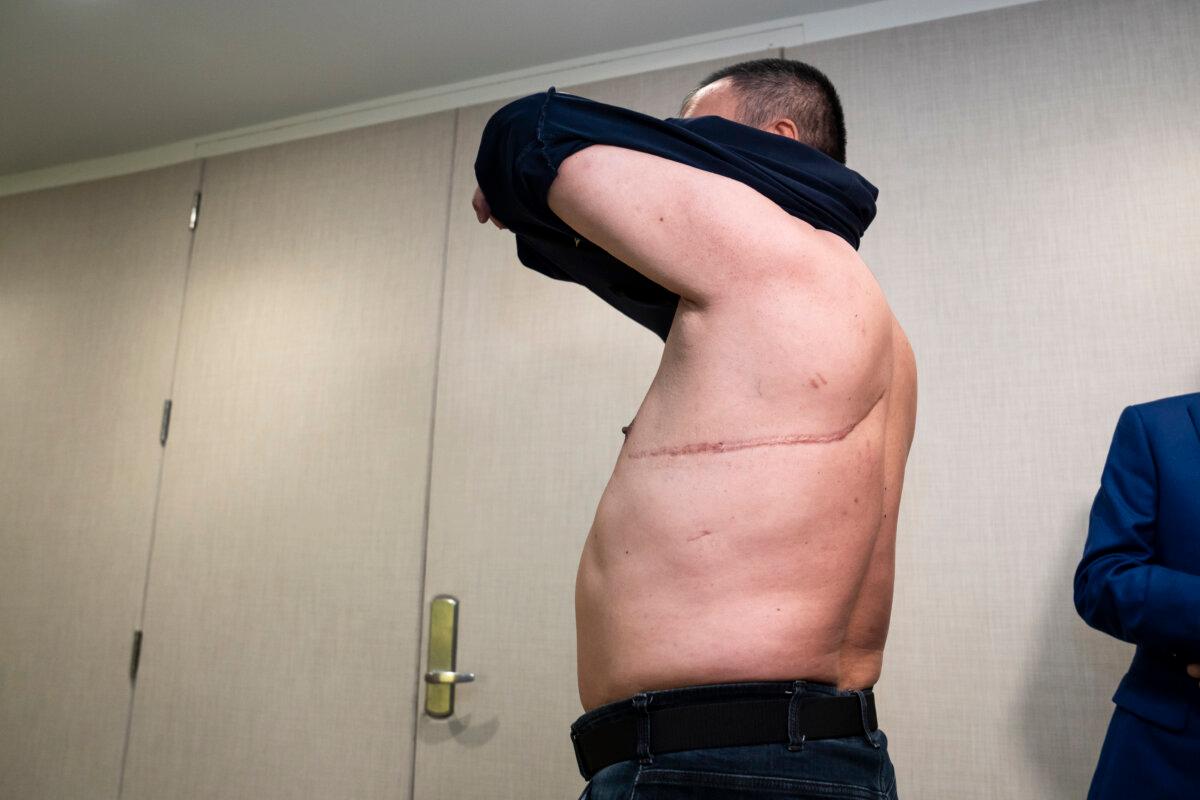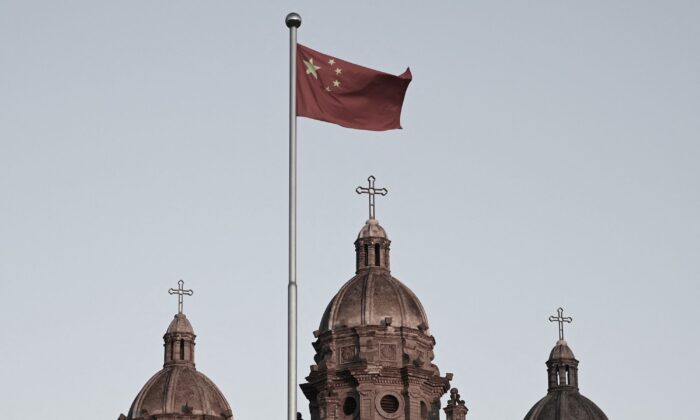Analysts say the goal is not to align religions with Chinese principles, but to subvert religions by compelling them to conform to the regime’s Marxist doctrines. According to the Chinese regime’s constitution, citizens have full religious freedom. However, policies implemented by the Chinese Communist Party (CCP) in recent years reveal their aim to control and modify religions to align with Marxist principles. This is done through a policy called “Sinicization,” which is applied nationwide to religions in China. The CCP’s version of “Sinicization” involves adapting religion to Marxism and CCP ideology, rather than to Chinese culture as traditionally understood. This coercive religious policy has fundamentally transformed China’s religious environment, as highlighted in a report by the United States Commission on International Religious Freedom (USCIRF). Through Sinicization, the CCP has interfered in religious affairs, leading to the removal of crosses from churches, closure or destruction of places of worship, imprisonment and killing of practitioners, and even attempts to control the selection of religious leaders. The ultimate goal of Sinicization is to bring all religious practices, doctrines, and leadership under the control and influence of the Party, rather than aligning them with Chinese values. This policy aims to make religions subservient to Marxism and CCP ideology, rather than embracing Chinese culture. Experts warn that Sinicization represents a new form of religious persecution in China, allowing the regime to control and manipulate faith groups while maintaining a facade of religious freedom. According to Depenbrok from the Global Christian Relief, all religious groups must register with state-approved organizations such as the Three-Self Patriotic Movement for Protestant congregations and the Chinese Patriotic Catholic Association for Catholics, which are overseen by the United Front Work Department. The UFWD, a state agency reporting directly to the Communist Party’s Central Committee, plays a key role in implementing and supervising Sinicization, coordinating various internal offices, including those for ethnic and religious affairs.
In June, a seminar on Sinicization was held in Beijing, attended by high-level religious affairs leaders, where the head of the UFWD emphasized the need to guide religions to adapt to socialist society. The UFWD collaborates with Party officials and patriotic association leaders to enforce new policies related to the Sinicization of Religions and ensure compliance with Party regulations.
A new management policy for religious venues, implemented in February, allows the regime to approve and supervise the opening and management of religious sites and their leaders, integrating the Party’s ideology into religious activities and teachings. This includes strict requirements for religious leaders to hold government-issued certificates and align with national religious group rules.
Additionally, the CCP’s religious policies focus on political indoctrination, promoting loyalty to the Party and its values under the guise of patriotism. This includes educational programs on Communist Party principles and Xi Jinping Thought. Pastors are pressured to promote the CCP’s agenda in sermons, redirecting focus away from spiritual matters.
The regime’s actions reflect its supremacy over religions, aiming to ensure conformity to Party beliefs. Similar indoctrination guidelines were emphasized in a recent UFWD meeting promoting strict governance of religion. The policy is also extended to Hui Muslims and Tibetan Buddhists, with reports of forced displays of loyalty to the Party.
The current religious repression in China echoes elements of the past, such as during the Cultural Revolution, where religious elements were removed and loyalty to the Party was emphasized. This includes instances of replacing religious symbols with images of Chinese leaders and promoting Party slogans in religious spaces. Ambassador Brownback noted the severe religious oppression during the Cultural Revolution, drawing parallels between that period and the current religious repression in China. Introvigne from Bitter Winter highlighted the destruction of cultural heritage as a policy of the CCP, particularly targeting architectural elements that are deemed non-Chinese. Notably, important Islamic symbols like the Shadian mosque have been targeted, reflecting the ongoing suppression of religious freedom in the country.
The Chinese Communist Party has intensified control over approved religions and cracked down on unregulated faiths since updating its regulations on religious affairs in 2018. Faith groups not recognized by the regime, such as house churches, face intimidation and persecution. Pastor Wang Yi of the Early Rain Covenant Church is serving a nine-year sentence for leading an unregistered church, highlighting the regime’s crackdown on unapproved religious gatherings.
Moreover, the CCP’s persecution extends to groups like Falun Gong, with efforts to coerce practitioners into renouncing their faith. Falun Gong, based on principles of truth and compassion, faced a brutal persecution beginning in 1999. Reports of torture and unjust detention emerged as the regime sought to suppress the practice due to its popularity and emphasis on independent thinking.
“So the CCP invests a lot of resources in trying to get Falun Gong practitioners,” Cook said of the regime’s attempts to make practitioners renounce their faith.
“On paper, that doesn’t sound too bad. But in practice, it’s very brutal.”
She described the methods used by the CCP to carry out this “reform.”
“They use a combination of psychological pressure, including trying to recruit family members to pressure Falun Gong practitioners, economic incentives, like depriving people of their pensions if they won’t renounce Falun Gong, and psychiatric abuse.”
In addition to the abuses described, Falun Gong practitioners have been one of the main targets of forced organ harvesting.

Cheng Peiming, a Falun Gong practitioner who had part of his liver and lung forcibly removed in China, shows his scar after a press conference in Washington on Aug. 9, 2024. Madalina Vasiliu/The Epoch Times
Months ago, the Falun Protection Act, a bill aimed at sanctioning people involved in the forced removal of organs from Falun Gong practitioners in China, was passed by the U.S. House of Representatives. A companion bill has been introduced in the U.S. Senate.
Cook said that the bill’s potential impact is not limited to Falun Gong, as it is linked “more broadly to the issue of organ transplant abuses in China” and aims to sanction those involved in medical misconduct.
“Falun Gong practitioners are a key target of those abuses, but they’re not the only ones. So I think that’s why passing a bill like this, [which] is not just a resolution, it would actually be law. … It would require the U.S. government to take certain actions. It could be important both for Falun Gong believers in China, but also for other religious believers.”
Using Technology for Persecution
For those who have chosen to profess their faith in a way that is not in line with the regime’s orders, and who have to do so stealthily, the pressure has become even greater as the party advances its technological apparatus for surveillance.
Nettleton pointed out that a key difference between the religious persecution perpetrated by the regime and that happening elsewhere in the world is the use of advanced technology to monitor the population in detail.
“The scale of budget, technological tools, and manpower make Christian persecution in China different from what Christians are facing in almost all other countries,” he said.
‘Faith Will Survive’
Ambassador Brownback said he believes that despite the regime’s brutal persecution, its attempts to eradicate people’s faith will not succeed.
“This is not going to work. As I’ve called it and said many times, this is … the Chinese Communist Party’s war on faith. It is a war they will not win.”
“I interviewed a Falun Gong man, the only one I’ve ever met, who survived forced organ harvesting. He had joined the Falun Gong movement because it had given him hope and healing from a heart condition that he had. And they beat on him, they did everything possible to him to try to get him to quit his faith. And it just made it deeper in him,” Brownback said.
Please rewrite this sentence. Can you please rewrite this sentence?
Source link






